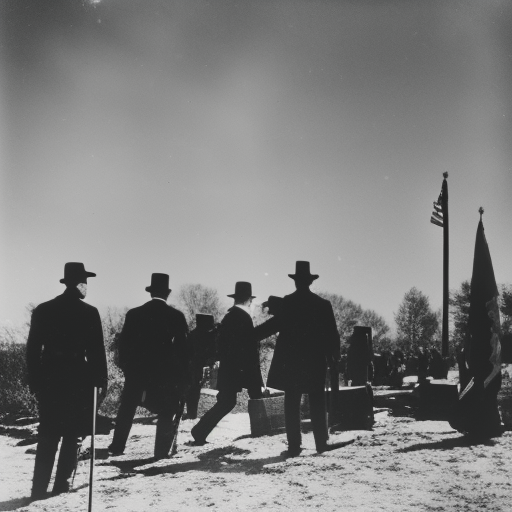Summary:
The assassination of Abraham Lincoln, the 16th President of the United States, took place on April 14, 1865. Lincoln was shot by John Wilkes Booth, a Confederate sympathizer, while attending a play at Ford’s Theatre in Washington, D.C. The assassination occurred just days after the end of the American Civil War and had a profound impact on the nation.
Background:
Abraham Lincoln had led the United States through the Civil War, a conflict that had torn the nation apart. As the war neared its end, Lincoln focused on the process of reconstruction and healing the wounds of the nation. On April 9, 1865, General Robert E. Lee surrendered to Union General Ulysses S. Grant, effectively ending the war. This victory was a cause for celebration, but it also fueled resentment among Confederate sympathizers.
The Assassination:
On the evening of April 14, 1865, Lincoln and his wife, Mary Todd Lincoln, attended a performance of the play “Our American Cousin” at Ford’s Theatre. John Wilkes Booth, a well-known actor and Confederate sympathizer, had been plotting to assassinate Lincoln for some time. Booth saw an opportunity when he learned that Lincoln would be attending the play.
During the third act of the play, Booth entered the presidential box where Lincoln was seated and shot him in the back of the head. The president slumped forward, and chaos erupted in the theater. Booth then jumped onto the stage, shouting “Sic semper tyrannis!” (Thus always to tyrants), the state motto of Virginia. He managed to escape despite breaking his leg during the fall.
Aftermath:
The news of Lincoln’s assassination spread quickly, plunging the nation into mourning. Lincoln was transported to a nearby boarding house, where he died the following morning. Vice President Andrew Johnson was sworn in as the 17th President of the United States.
The assassination of Abraham Lincoln had a profound impact on the nation. It created a sense of shock and grief among the American people, who had come to view Lincoln as a symbol of hope and unity. The loss of their leader at such a critical time in the nation’s history was a devastating blow.
The assassination also had political implications. Lincoln’s death meant that the process of reconstruction would be led by a new president, Andrew Johnson, whose approach differed from Lincoln’s. Johnson’s policies were seen as lenient towards the former Confederate states, leading to tensions and conflicts in the years that followed.
In addition to the political and emotional impact, the assassination of Abraham Lincoln also had a lasting cultural significance. Lincoln became a martyr, and his legacy as the Great Emancipator and the savior of the Union was solidified. His death elevated him to a legendary status in American history.
The assassination of Abraham Lincoln remains one of the most significant events in American history. It marked the end of the Civil War era and the beginning of a new chapter in the nation’s history. Lincoln’s death left a void that would take years to fill, and his memory continues to be honored and revered to this day.












